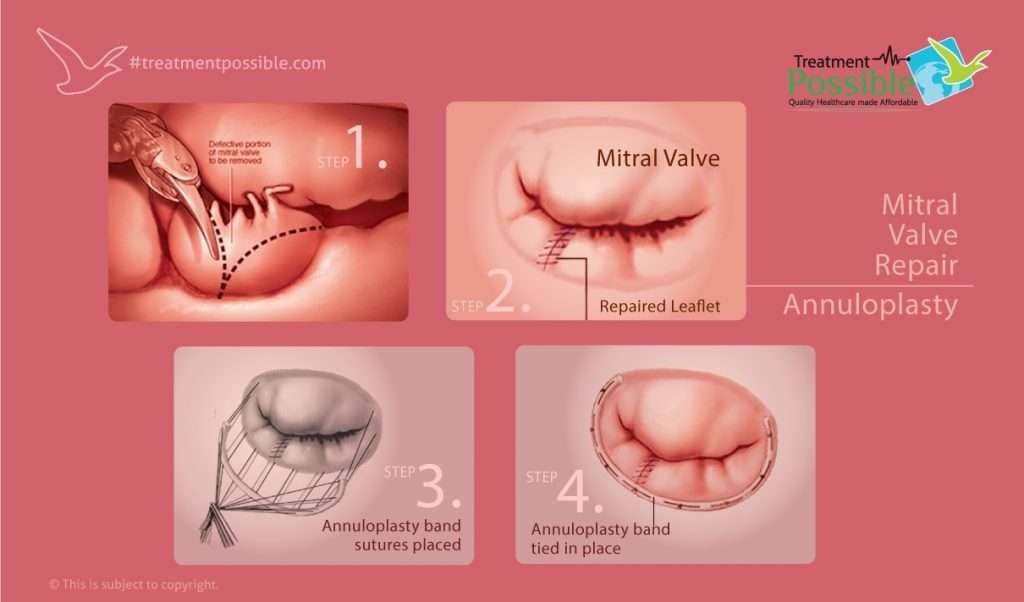Request a Free Estimate

- Travel to India for Affordable and Advanced Healthcare
What is Mitral Valve Repair?
Your mitral valve is an essential part of your heart and it has two flaps. As the heart pumps blood, your mitral valve opens and closes tightly. The mitral valve ensures that blood flows in only one direction, preventing backflow. If your mitral valve does not function properly, then you may need mitral valve repair surgery. Your doctor will recommend mitral valve repair surgery for the following heart conditions:
-
In mitral valve stenosis (narrowed valve opening), where the leaflets become thick or stiff, and the valve is unable to open fully resulting in reduced blood that is able to flow from the left atria into the left ventricle. This can occur due to hereditary factors, ageing, rheumatic fever, or the build-up of calcium or cholesterol on the leaflets. If mitral stenosis is left untreated, it can lead to heart failure or even sudden death.
-
In Mitral valve prolapse (bulging valve), where the mitral valve leaflets are floppy or loose. Mitral valve prolapse leads to mitral valve regurgitation.
-
In mitral valve regurgitation (leak in a heart valve), where the blood flows backwards into the heart causing the heart to work harder to pump blood and the leaking valve needs to be corrected. This leaking can occur because of a heart defect, damage from a heart attack, advanced age, or even a bacterial infection in your valve.
Once the mitral valve is damaged it loses its ability to pump blood. Therefore, mitral valve repair surgery (annuloplasty or valvuloplasty) could be recommended.
How is Mitral Valve Repair Performed?
The surgery is performed under general anaesthesia. You will be placed on a bypass machine that keeps blood circulating through your body and your lungs functioning during surgery. Your surgeon will make an incision through which the current mitral heart valve will be repaired with an annuloplasty or a valvuloplasty:
In the case of mitral valve regurgitation or Mitral valve prolapse – An annuloplasty is recommended when blood can leak backwards through the valve or the mitral valve opening is loose. In an annuloplasty, the doctor inserts a catheter with a clip attached to an artery in the groin and guides it to the mitral valve and the clip is used to reshape the mitral valve. Then the doctor sews a band to the existing ring around the valve and tightens the ring (annulus) around a valve in the heart. The band may be rigid or flexible.
In case of mitral valve stenosis (narrowed valve opening) – When the mitral valve opening is stiff or tight then valvuloplasty is recommended. This can also be treated with a catheter procedure called balloon valvuloplasty. During this procedure, the doctor inserts a catheter with a balloon on the tip into an artery in your arm or groin and guides it to the mitral valve. The doctor then inflates the balloon, which expands the opening of the mitral valve, after which the balloon is deflated, and the catheter and balloon are removed. Valvuloplasty improves blood flow through your heart and reduces your symptoms. However, the valve may narrow again. You may need to have another valvuloplasty or mitral valve repair surgery or mitral valve replacement surgery in future.

Want more clarification about medical expense & treatment plan?
Plan Your Mitral Valve Repair In India
Get a Free Doctor's OpinionWhatapp UsWhat happens after a Mitral Valve Repair?
After your surgery, you will be shifted to the intensive care unit (ICU) depending on your condition and surgery.
- Your treatment team will monitor your condition and watch for signs of infection in your incision sites.
- Your team will check your blood pressure, breathing and heart rate.
- Your treatment team will instruct you to walk regularly to gradually increase your activity, to cough and do breathing exercises as you recover.
- After the surgery, your physician will advise you to strictly avoid all foods that are high in sugar and sodium. This includes processed foods and baked goods that might contain artificial preservatives.
- Follow-up appointments are important and will help your doctor determine whether you are ready to resume your everyday activities, such as working, driving and exercising.
What are the Complications of Mitral Valve Repair?
The possible complications include the following:
- Bleeding during or after the surgery
- Blood clots that can cause heart attack, stroke, or lung problems
- Infection
- Pneumonia
- Breathing problems
- abnormal heart rhythms
- The repaired valve does not work correctly
Life after a Mitral Valve Repair:
Full recovery can take a few weeks or up to several months, depending on your rate of healing and the type of surgery performed.
- An echocardiogram is recommended annually to assess valve function.
- Your doctor might instruct you on making healthy lifestyle changes including physical activity, a healthy diet, stress management and avoiding tobacco use to keep your heart working well.
- Your doctor might recommend that you participate in the cardiac rehabilitation program of education and exercise designed to help you recover after heart surgery, improve your overall cardiovascular health and reduce the chances of a heart attack, heart failure or any complications with the mitral valve in the future.
Mitral Valve Repair at Treatment Possible:
We have one of the best teams of cardiology doctors and the best cardiologists in India, who are highly specialized in treating Aortic valve repair, Aortic valve replacement, Mitral valve repair, Mitral valve replacement, CABG, Heart Bypass Surgery and so on. Heart surgery is one of the most critical surgeries. Hence, the surgeon should be chosen wisely.
Get Free Consultation with chosen Top Cardiac Surgeons in India with the hassle-free setup of post-operative recovery care, medical travel & stay during the Mitral valve repair in India. You can also send your medical reports for Mitral valve repair to care@treatmentpossible.com for free opinions and suggestions from the best cardiac surgeons for Mitral valve repair in India. No matter what the health condition, you always get good healthcare options and cost advantage from Treatment Possible.
Our Services
From Treatment To Recovery, We Are Always There With You!

Medical Visa Letter
We provide a Medical visa letter for which we require the scanned passport copies of the patient and attendant.

Arrange An Appointment With A Surgeon
We arrange for the appointment with the surgeon, confirm for the hospital room and operation theatre (if required)

Post Surgery Follow Up
We help you to fix your telephonic appointment for future follow-ups

Complimentary Pickup
We arrange for complimentary pickup and drop services from the airport.

All The Necessary Arrangements
We arrange for hospital admission, forex exchange, sim card and local assistance

No Need To Worry About Essential Expenses!
We help in sorting out the hospital bill, return ticket, medicines and other essential purchases.
Frequently asked questions:
What are the advantages of Mitral Valve Repair?
- Improved survival rates
- Better preservation of heart function
- Lower risk of stroke and infection (endocarditis)
- Eliminates the need for blood thinners after surgery (anticoagulation)
When is valvuloplasty recommended?
Your doctor may recommend valvuloplasty:
- If you have narrowing of the mitral valve (mitral valve stenosis)
- If you have a narrowed tricuspid or pulmonary valve
- If you have a narrowed aortic valve (aortic valve stenosis).
What is the success rate of Mitral Valve Repair surgery?
After mitral valve repair, 95% of patients are free of re-operation for 10 years.
What are the treatment options for heart valve surgery?
There are two options for heart valve surgery, they include the following:
-
Valve repair is used for mitral valves that become loose and leak but are not seriously damaged.
-
Valve replacement is used for mitral valves that are seriously damaged. The diseased valve is replaced with a new valve (mechanical valves or biological valves).
